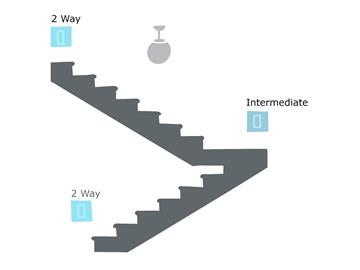
What is the difference between a 2 way switch and an intermediate switch?
The main difference between an intermediate switch and a two way switch is the way they can be used in combination with other switches. When there are more than two switches on one lighting circuit, you need one of those switches to be an intermediate switch.
When to Use Intermediate Switches
Intermediate switches placed in the middle of a circuit, between two 2-way switches. They enable you to switch lights on and off while still making it possible to use the other switches.
When to Use 2-Way Switches
Two way switches are able to work in conjunction with another two way switch on one circuit. This enables both switches to turn the light/lighting circuit on and off.
As mentioned above, you also need 2-way light switches on the end of a circuit that has intermediate switches in the middle.
A Summary of What to Use and When
One switch: 1x 1-way or 2-way switch needed
Two switches: 2x 2-way switches needed
Three switches: 2x 2-way switches and 1x intermediate switch
Four or more switches: 2x 2-way switches and the rest are intermediate switch
Can You Use Intermediate Switches for 2-Way Switching?
It is possible, but as the internal workings are more complicated, intermediate switches are noticeably more expensive, so it is sensible to only use them when intermediate switching is necessary.